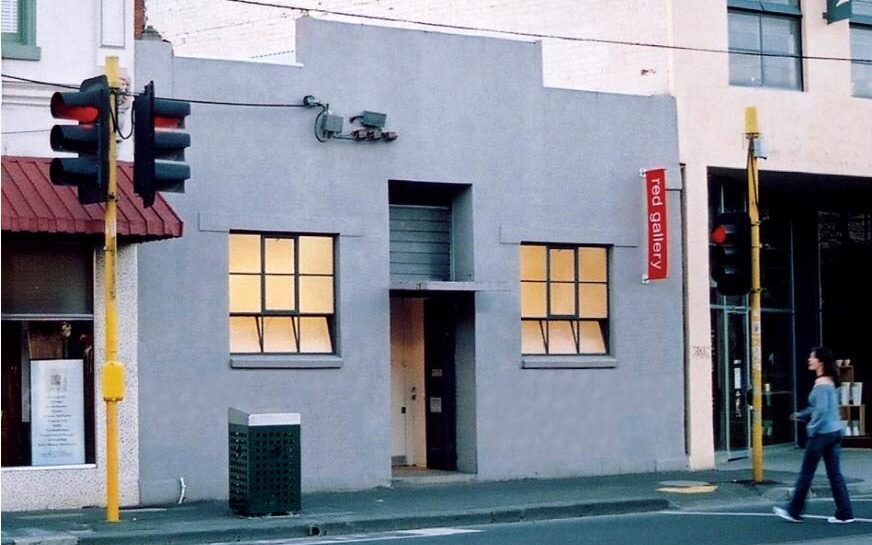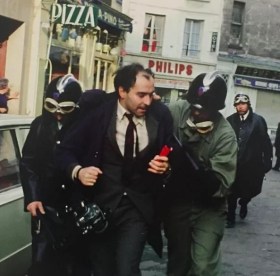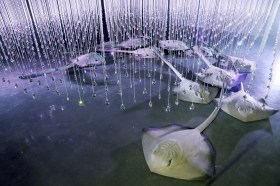A commercial art gallery in Melbourne has artists seeing red over ‘unprofessional’ conduct on the part of the gallery owner.
RED Gallery in Fitzroy North opened in 2002 and bills itself as a “contemporary art space”. The gallery changed hands in 2019, when previous owner Kim Wall sold the business to current owner and Creative Director, Elle Rusch Drakos.
In response to the unfolding story, which has seen numerous artists publicly outing the gallery for misconduct, Wall tells ArtsHub it has been a ‘distressing experience’. She says settlement for RED Gallery was only finalised ‘after around six very long, protracted and unnecessarily emotionally-damaging months of dealings’.
Wall continues: ‘Settlement [for RED Gallery] occurred two months before the lockdowns and pandemic… Jenny Port and I started RED Gallery over 20 years ago and we wanted it to continue for many years, as it provided a great hub for the arts community. We were willing to pass on our hard-earned goodwill and offered the new buyer assistance for a smooth transition. We took our reputation seriously.’
After the sale, Wall says she cannot go near the gallery ‘without being triggered’.
A Facebook post made last week by Melbourne-based visual artist Ying Huang brought ArtsHub‘s attention to the allegations. Huang explains that last December she had been part of a group exhibition at the gallery. ‘This was my very first time exhibiting at RED Gallery after the new owners took over,’ says Huang. ‘I entered four works and they all sold.’
The artist contract stated that settlement was to be paid within 30 days of the exhibition and a clause in a second contract stipulated that buyers had 28 days to complete their purchase.
Huang continues: ‘Twenty-eight days after the show, which would have been in January, usually [RED Gallery] would have sent out a sales report, but this was not received.
‘From January to March, I continued to email them, but I never received a reply. In the first week of March, I sent them an email saying if they didn’t pay by the end of the week they would face serious consequences.
‘Within five minutes I received an email back saying they didn’t understand why I did this. According to them I had been paid.’
The gallery allegedly claimed an error was made while processing the payment. Only on Wednesday that week in March did Huang receive settlement for her works sold in December the previous year.
Selected as the winner of the group exhibition, Huang was awarded a second, solo exhibition at RED Gallery held across two weeks in August.
Huang’s exhibition was a success and sold out. However, the fear that previous experiences would be repeated soon became a reality. Seventy-eight days after the exhibition and 43 days after invoicing without receiving payment from the gallery, Huang ended up seeking legal counsel.
After letters of demand were sent to RED Gallery on 6 November, and again on 15 November, Huang finally received settlement on 17 November.
Purchasers of Huang’s works have also alleged that at least seven emails were sent to the gallery without reply following the purchase of a work online that the gallery had incorrectly sold twice.
Being a full-time visual artist, Huang was forced to borrow money from friends to get by while waiting for payment, describing the actions of the gallery as ‘ruthless’.
‘When I have exhibitions, that’s my opportunity to support myself. Because it’s towards the end of the year I had a lot of big bills coming in. I needed that money and had already planned financially,’ says Huang.
‘My greyhound needed veterinary care. Her well-being is number one and I couldn’t pay for bills. Every sale of a painting goes towards her care.
‘When the money didn’t come in, I had to take a loan from a friend, it was incredibly stressful and emotionally I was devastated. I can’t believe someone would do such a thing to artists, and yet [Elle Rusch Drakos] claims to be an artist herself.’
‘I still can’t believe that people in the industry to this day can be so ruthless.’
Read: Dark side of the arts: where fear and transparency collide
Huang is not alone. Visual artist Andria Beighton, who exhibited at RED Gallery from 1-12 of June last year, has also spoken out in regards to the gallery’s conduct.
Beighton says of her experience, ‘Everything that could go wrong, did go wrong.
‘They were unprofessional [with] poor communications. They were supposed to put up paid ads for my show, which nobody saw on social media until I complained.
‘The gallery wasn’t supervised. A number of people told me they went along to the exhibition only to find it unattended. There was no catalogue for the show until well into the exhibition.’
Beighton, who paid around $2400 to host her exhibition at RED Gallery, made less than $1000 from the sale of two small works.
When Beighton approached the gallery with her concerns, she says that even in her personal life, she ‘had never been spoken to the way I was in those emails’.
She adds: ‘The gallery has changed it so they are not making commissions, [which means] there really is no incentive to sell artists’ work.’
Beighton alleges that another visual artist from Sydney had reached out to her soon after she made her experience public, asking for advice on ‘how to get their works returned from the gallery’.
‘This artist told me that the gallery had held onto their work for nine months, with no communications, no response to emails.’
Beighton also reveals that that another visual artist is owed $800 from a group exhibition held earlier this year. ‘I don’t want other artists to go through this. For a gallery to not even do the bare minimum is really disheartening,’ she says.
When RED Gallery was approached by ArtsHub, Creative Director Drakos says that she ‘didn’t know how to respond’.
‘All the allegations in their essence are correct – I have struggled to pay my artists on time. I realised I was not doing the right thing. [I was] taking very small deposits from buyers and then they would disappear without paying the balance and I was stuck.
‘I am a single mum with a very small source of income, so I needed the artworks paid for to pay the artists. It was just a vicious circle. I have now realised that my business practices were not correct.
‘I wish no one any harm and I am so sorry I have hurt people. I am devastated.’
This article is published under the Amplify Collective, an initiative supported by The Walkley Foundation and made possible through funding from the Meta Australian News Fund.





